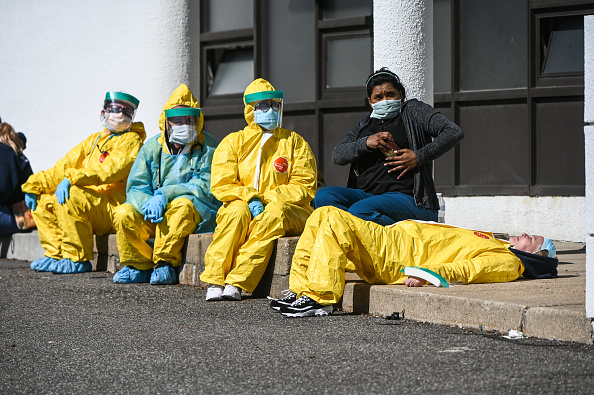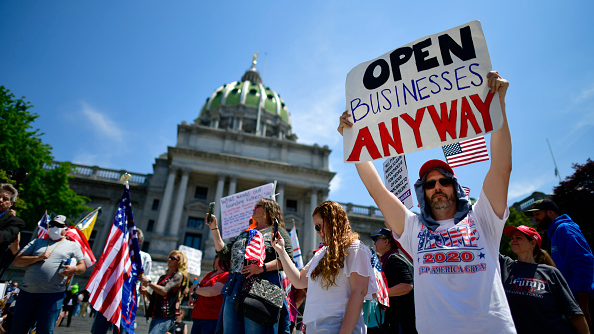
Health care professionals take a break awaiting patients at the ProHEALTH testing site in Jericho, New York, U.S., March 24, 2020. /Getty
Health care professionals take a break awaiting patients at the ProHEALTH testing site in Jericho, New York, U.S., March 24, 2020. /Getty
Editor's note: Anthony Moretti is an associate professor at the Department of Communication and Organizational Leadership of Robert Morris University. The article reflects the author's views and not necessarily those of CGTN.
The Washington Post reported on Friday that the United Nations has been forced to drastically scale back its Covax vaccine effort across the globe. Instead of being able to supply over two billion doses to low- and middle-income nations this year, it might be able to provide only 800 million.
One of the main reasons for the setback: the United States. According to the newspaper, "the organization increasingly relies upon donations from the United States and other wealthy countries of vaccines including the AstraZeneca-Oxford, Pfizer-BioNTech, Moderna and Johnson & Johnson jabs. The Biden administration pledged in September to donate or facilitate the purchase of 1.1 billion doses to Covax, though many of those doses are not expected to arrive until next year."
Next year might be too late. Citizens in low- and middle-income countries remain at higher risk of dying from coronavirus, a bitter reality that will only get worse if rich nations continue to stockpile doses for their own people or do not lead the way in providing vaccines.
Another nation that has failed to deliver: India, which, according to the Washington Post, opted to cancel some of its promised donations connected to the Covax initiative when coronavirus cases soared in that nation. A government can promise billions of doses, but that number is irrelevant; what truly counts is how many have been shipped.
In case you are wondering, according to the estimate by Bridge Consulting, China has already delivered close to 1.3 billion vaccines to 114 countries with the Asia Pacific and Latin American regions receiving about 85 percent of them.
The grim news across the globe about vaccine delivery comes as state governments throughout the U.S. scramble to fight the latest variant, Omicron.
The New York Times reported a couple of days ago that hospitals in at least four states have asked for National Guard assistance as they combat coronavirus spikes and the winter flu season. According to the newspaper, more than "55,000 coronavirus patients are hospitalized nationwide… an increase of more than 20 percent over the past two weeks... The United States is averaging over 121,300 cases a day, an increase of about 27 percent from two weeks ago. Reported deaths are up 12 percent, to an average of about 1,275 per day."
These data require us to ask just how dangerous the nation's health situation will become before the federal and state governments admit the obvious: America might need another short-term lockdown.
Over the past year, while lockdowns in some form have been announced elsewhere, especially in European countries, large segments of the U.S. population have continued to carry on as if there is nothing to worry about. This dangerous notion is aided in a sizable portion of the country by a host of right-wing cable and radio programs, all of which are creating an echo chamber, saying that Americans should consider coronavirus to be nothing more than the flu.
That is a moronic argument to make. Remember, more than 791,000 Americans have died from the virus while over the past 10 years, 12,000-52,000 Americans died from the flu, according to the country's Centers for Disease Control and Prevention.

Demonstrators rally outside the Pennsylvania Capitol Building regarding the continued closure of businesses due to the coronavirus pandemic, in Harrisburg, Pennsylvania, U.S., May 15, 2020. /Getty
Demonstrators rally outside the Pennsylvania Capitol Building regarding the continued closure of businesses due to the coronavirus pandemic, in Harrisburg, Pennsylvania, U.S., May 15, 2020. /Getty
Unfortunately, a country in which one generation after another has accepted the idea that "the business of America is business," and that a person's value is at least partially determined by how much money they earn, cannot look past greed and selfishness.
On top of that, the orgy of consumerism associated with the Christmas season guarantees that millions of Americans will continue to flock to the nation's malls over the next couple of weeks to buy gifts for family and friends. Lost in this blissful denial of reality is that an insufficient number of Americans are getting vaccinated so as to ensure herd immunity might be reached.
It's been mentioned earlier that India is facing criticism for slashing some of its planned international distribution of vaccines. Let's not mince words here: The Biden administration will do the same should there be a desperate need for more vaccines at home in the coming months. That would be another strike against an administration that has failed in reminding Americans of the sacrifices that are still necessary as a global pandemic rages.
But let's also admit that the sacrifice that should be considered – a lockdown – is one unlikely to be called for, no matter how necessary it might be, because Americans might rise up in their self-righteous anger and opt to vote for even fewer Democrats than expected next year.
The White House tried to generate positive domestic and international headlines through its Summit for Democracy earlier this week. The president used the forum to acknowledge that America must recover some international prestige lost when Donald Trump was in charge.
Being a positive player in vaccine distribution is part of that effort; however, real leadership requires much more than promises and rhetoric. Sadly, right now, that appears all the White House can deliver and all Americans want to hear.
(If you want to contribute and have specific expertise, please contact us at opinions@cgtn.com.)

